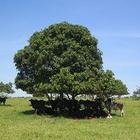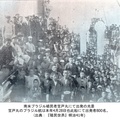いくら日本人移住地だとはいってもブラジル人が一切住んでいなかったわけではない。少ないときでも人口の1割程度はブラジル人が占めていた。とはいっても、それはやはり異常な数字には違いないが。
ブラジルでは、いつも北の方からサンパウロ方面に向けた労働者の移動があるようだ。それは時々、はっきりした理由があって大きな流れになるが、どうやらサンパウロに行けばいいことがあるらしい、という程度の漠然とした期待感が北の人たちにはわけもたれているらしい。
ATさんが子供のころ、一家はやはり北の町からサンパウロを目指して出発した。その途中、もうすぐサンパウロに到着するという段になって、一足先に 来ていた親戚から、自分がいま住んでいる町に来れば仕事があるとの情報がもたらされ、進路はそれに沿って微妙に変更されることになる。家族を乗せたカミヨ ン(軽トラック)はサンパウロをそれ、はるか奥地の、まだできて間もない町を目指すことになった。
途中から一行に加わった親戚の道案内で野原の道をずっと進んでいくと、ひとつ橋を渡ったあたりから、ようやくちらほら人と行き違うようになった。興味津々に人びとの顔を眺めていたATさんだったが、感心のあまりとうとうその親戚に声をかけた。
「おばちゃん、なんてまあ大きな家族だろう!!」
思い出しながらゲラゲラ笑うATさんの説明によると、橋を境に一行は日本人移住地に入っていたが、日本人を知らなかったAT少年の目には、出会う人、出会う人皆そっくりな顔に見えたものだから、これがみんな一族なのかと思ってびっくりしたのだという。
「あれが日本人だよ。これからみんなでここに住むんだ。」
おばさんはそう少年に告げた。その時はそこにこれほど長く暮らすことになるとは思わなかっただろうATさんは、結局この町で結婚し、子供を育て、今では孫もここにいる。ちょっとした大きな家族だ。
木を切り倒し、焼き払う、という作業は、日本で一般にやる農業にはないものだから、そこには経験豊かなブラジル人の働き手が必要になってくる。畑が できたらできたで、日本では考えられないような広大な農地を家族だけで世話することは難しい。一時は町のホテルが口入屋のようになって、入れ替わり立ち替 わりで常に幾人か逗留しているブラジル人を、日本人がひっきりなしに雇いにきたそうだ。
しかしATさん一家のように長く町に留まったひとは、案外少なかったようだ。ブラジル人たちのなかには、日本人のあまりの多さに気分が悪くなったと言って去っていく者もあったという。
長く暮らしているブラジル人に、昔の町の様子や日本人のことを聞くと、だいたい同じような返事が返ってくる。日本人の奥さんは本当に働き者で、旦那 さんはそうでもなかった、というのは前回野球の話でも紹介したが、皆が口をそろえて言うのは、「日本人はブラーボ(bravo)だったなあ」ということ だ。
Bravo。勇敢な、という意味もあるポルトガル語だが、ここではあんまりよい意味では使われていないような気がする。怒りっぽい、とかそんなニュ アンスだろう。尋ねてみる機会はまだないが、一般的な日本人が雇用主として一般的なブラジル人にかかわる場合、今でも似たような印象を与えているのではな いだろうか。日本人はだいたいにおいて相当仕事に厳しい。Bravoという評判にもなるだろう。
そんな日本人を、Bravoなだけの不愉快な連中だとしか思えなかったブラジル人たちは早々に町を去っていったことだろう。どこか日本人と気があっ たか、町を出ようにも出られなかったかで長く付き合う事になった人たちは、そのうち単なるBravoな連中でもないらしいということに気づいてくれたよう だ。
「日本人と働いていると、給料はごまかされないし、期日にきちんと支払ってくれた。働くなら日本人のところだね」
町にいついたブラジル人からは、そんな評価も聞く。
おとなになってからATさんは、一度大きな町に働きに出た。その時自分が感じた違和感を、これも笑いながら語ってくれた。
「買い物しても、町をぶらついても、日本人がいないとなんだか落ち着かないんだ」
ATさんは結局町に戻って家庭を持った。相手はブラジル人だ。
日本人はずっと日本人以外とは結婚しないものだった。日本人女性と恋愛したATさんの知り合いは駆け落ちしなければならなかった。しかしそれはもう 昔の話になった。ATさんの息子は日本人の女性と結婚し、孫はその血が明らかな顔立ちだ。カラオケ教室に通い、日本人離れしたパンチの効いた演歌を持ち歌 にあちこちの大会で好成績を収めている。
面白い話がある。現在、町の人口の8割はブラジル人だが、まわりの町のブラジル人たちには、ちょっと変わった人たちだと思われているという。たとえ ば、自分の意見を述べるのに、ブラジル人には曖昧に聞こえる「アショケ(私はこう思う)」という表現をやけに使う。仕事ぶりは生真面目だ。
あそこのブラジル人はだんだん日本人に似てきている、ということでみな納得しているのだそうだ。
© 2007 Shigeo Nakamura





